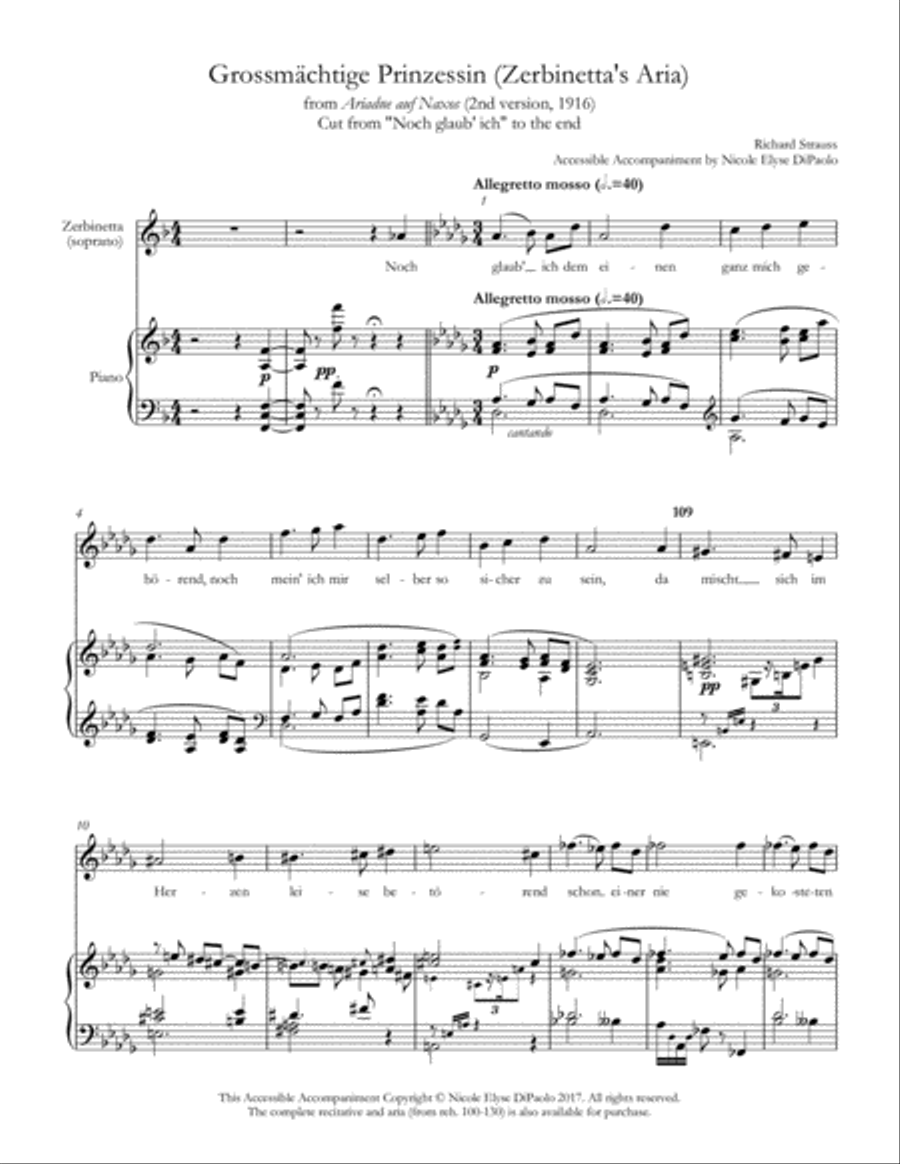Soprano voice,Vocal Solo - Digital Download SKU: A0.799614 Composed by Richard Strauss. Arranged by Nicole Elyse DiPaolo. 20th Century,Romantic Period. 12 pages. Nicole Elyse DiPaolo #5022031. Published by Nicole Elyse DiPaolo (A0.799614). The first of its kind, and the sixth entry in Nicole Elyse DiPaolo's Accessible Accompaniments series of aria reductions, this is a genuinely playable and piano/vocal reduction of Grossmächtige Prinzessin, Zerbinetta's famous aria from Strauss's Ariadne auf Naxos (second version, 1916). Please note that the version on this page is a cut beginning from Noch glaub' ich and the complete aria, from rehearsal nos. 100-130, is available separately. Coloratura sopranos who love this aria no longer need to fear bringing it in for auditions, last-minute performing engagements, or other situations in which the pianist may have to sight-read from the chaotic and sometimes unplayable vocal score. Pianists may now enjoy playing this aria comfortably, without risking strain/injury.In addition to the current cut, one beginning at So war es mit Pagliazzo is also available. To see previews of those sections within the aria, please visit their respective SheetMusicPlus pages.All Accessible Accompaniments, including this one, boast several unique features:1. No reduction ever requires stretches of over an octave, not including bass notes meant to be held or fudged with the pedal (though octaves may also contain chord tones within them). This reduces the amount of rearranging that smaller-handed pianists must already do. Obviously, further reworkings are to be expected and pianists should feel free to add to or modify what Iâve provided.2. Iâve included less essential, but potentially desirable additional voices/passages in cue-size noteheads so that pianists can easily see them, but know that they are not necessary in a sink or swim accompanying situation. Presenting less essential material in cue-size noteheads also reduces visual clutter on the page.3. In addition to the composerâs markings, when needed, I have included hints on particular notes to bring out when the singer is likely to need them as a pitch anchor or when it is not obvious which line should be brought out within the texture.4. All page turns have been carefully selected so as to result in the least possible disruption to the pianist when possible. When an inevitable page turn precedes a potentially surprising note or chord, Iâve included the next downbeatâs notes in cue-size stemless noteheads at the end of the preceding measure.5. When known, Iâve noted alternate cuts that singers might like to take within certain arias.6. In some cases Iâve modernized spelling conventions for easier readability (for example, by replacing à with ss in German arias) and occasionally I've enharmonically respelled brief passages for greater clarity.About the Arranger: Praised as a sensitive pianist and outstanding accompanist who delivers powerful interpretations, Nicole Elyse DiPaolo enjoys a multifaceted career as a sought-after collaborative pianist, educational composer, arranger, coach, private teacher, and adjunct music professor. Currently based in the Cleveland area, Ms. DiPaolo has appeared as a concerto soloist with the Ambassador Chamber Players on multiple occasions and as a recitalist, collaborator, and presenter worldwide. Currently, Ms. DiPaolo is an online Adjunct Lecturer in Music at Indiana University; the Principal Theory Teacher at Liberty Park Music, an online-only video subscription-based music school; an invited blog contributor and guest instructor at Tonebase; and a sought-after online instructor of piano, music theory, and composition who includes partimento and historical improvisation in her curricula. For more information, please visit http://ndipaolo.musicaneo.com .
